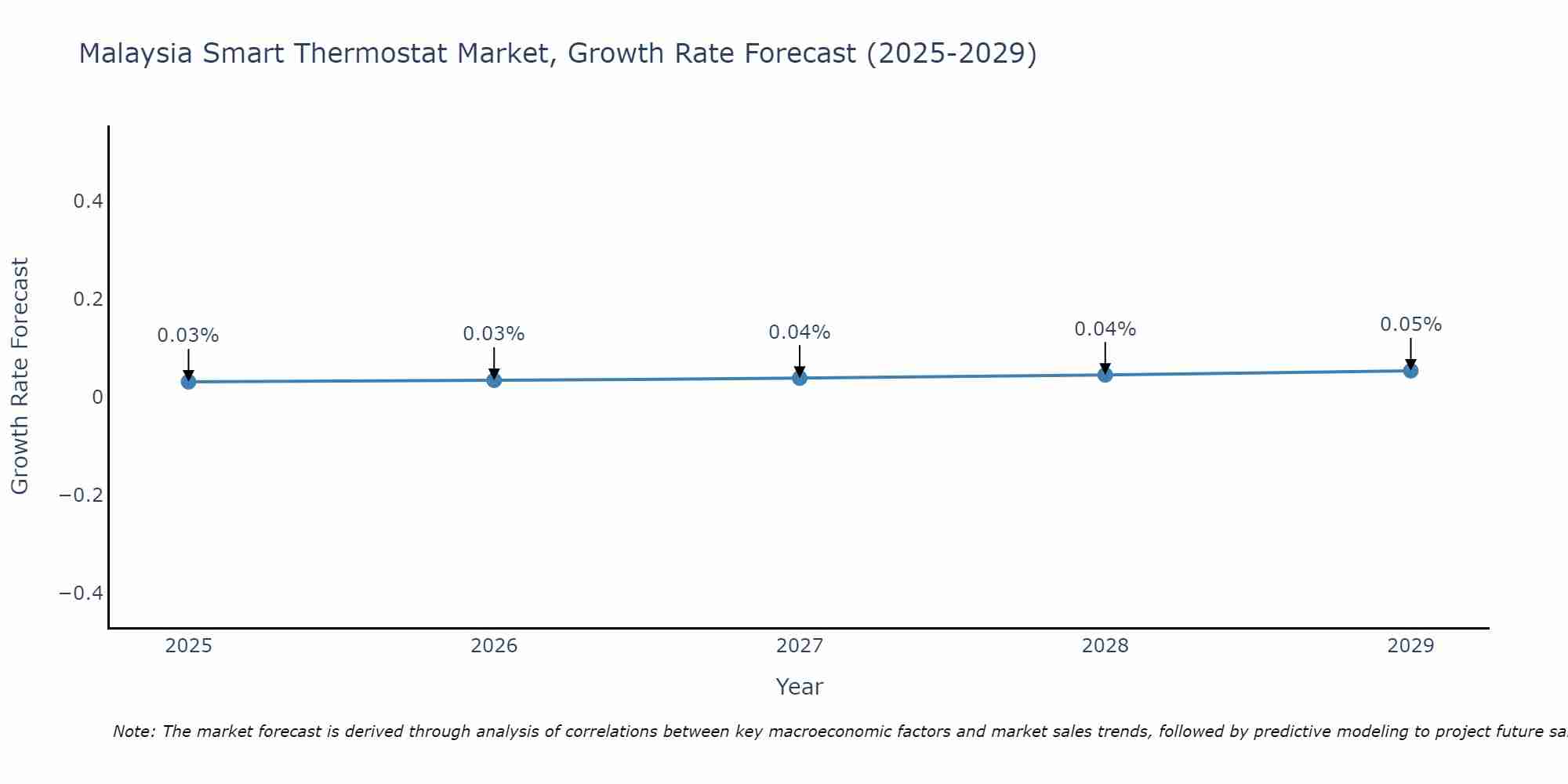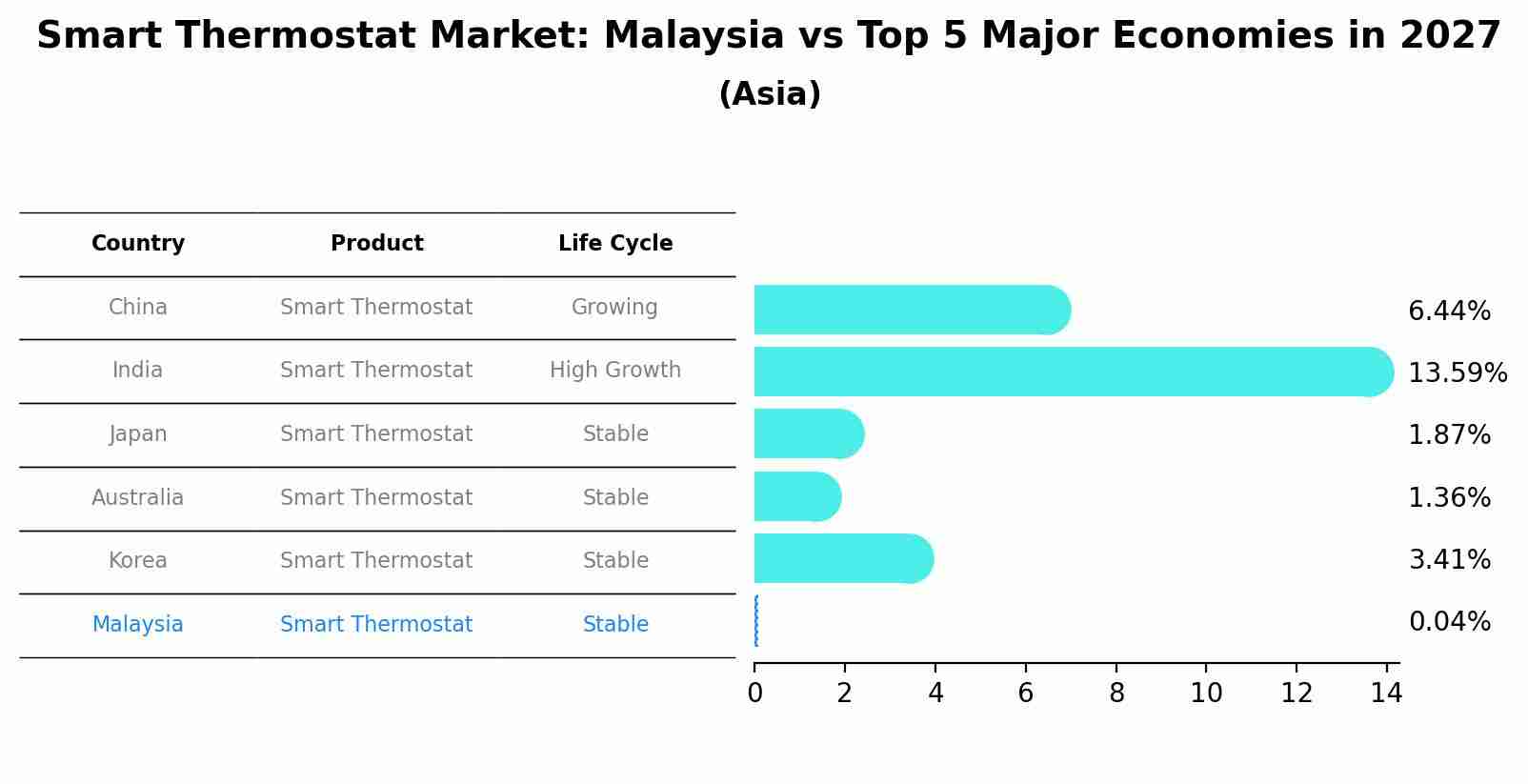Malaysia Smart Thermostat Market (2025-2031) Outlook | Revenue, Growth, Industry, Share, Trends, Forecast, Companies, Analysis, Size & Value
| Product Code: ETC369506 | Publication Date: Aug 2022 | Updated Date: Apr 2025 | Product Type: Market Research Report | |
| Publisher: 6Wresearch | Author: Ravi Bhandari | No. of Pages: 75 | No. of Figures: 35 | No. of Tables: 20 |
Malaysia Smart Thermostat Market Size Growth Rate
The Malaysia Smart Thermostat Market is poised for steady growth rate improvements from 2025 to 2029. The growth rate starts at 0.03% in 2025 and reaches 0.05% by 2029.

Smart Thermostat Market: Malaysia vs Top 5 Major Economies in 2027 (Asia)
The Smart Thermostat market in Malaysia is projected to grow at a stable growth rate of 0.04% by 2027, within the Asia region led by China, along with other countries like India, Japan, Australia and South Korea, collectively shaping a dynamic and evolving market environment driven by innovation and increasing adoption of emerging technologies.

Malaysia Smart Thermostat Market Synopsis
The smart thermostat market in Malaysia is experiencing a surge in demand, driven by a growing awareness of energy conservation and the need for intelligent climate control solutions. Smart thermostats offer users the ability to optimize energy consumption and reduce utility bills. Integration with smart home ecosystems and advancements in AI-driven temperature control are key trends shaping the market.
Drivers of the Market
The smart thermostat market in Malaysia is experiencing a surge in demand, primarily due to increasing awareness of energy conservation and the growing trend of smart home automation. Smart thermostats offer the ability to remotely control and program heating, ventilation, and air conditioning (HVAC) systems, leading to energy savings and enhanced comfort. Government incentives and rebates for energy-efficient appliances are further stimulating the adoption of smart thermostats.
Challenges of the Market
Smart thermostats are gaining popularity in the residential and commercial sectors for energy efficiency. Challenges include market competition and consumer awareness.
COVID-19 Impact on the Market
With more people working from home during the pandemic, energy-efficient home automation solutions like smart thermostats gained popularity. As Malaysia housing landscape evolves to include more smart homes, the smart thermostat market is poised for sustained growth as consumers seek comfort and energy savings.
Key Players in the Market
The smart thermostat market in Malaysia is on an upward trajectory owing to a growing focus on energy efficiency and the adoption of smart home technologies. Noteworthy players in this segment include Nest Labs (a subsidiary of Google LLC), Ecobee, and Honeywell International Inc.
Key Highlights of the Report:
- Malaysia Smart Thermostat Market Outlook
- Market Size of Malaysia Smart Thermostat Market, 2024
- Forecast of Malaysia Smart Thermostat Market, 2031
- Historical Data and Forecast of Malaysia Smart Thermostat Revenues & Volume for the Period 2021-2031
- Malaysia Smart Thermostat Market Trend Evolution
- Malaysia Smart Thermostat Market Drivers and Challenges
- Malaysia Smart Thermostat Price Trends
- Malaysia Smart Thermostat Porter's Five Forces
- Malaysia Smart Thermostat Industry Life Cycle
- Historical Data and Forecast of Malaysia Smart Thermostat Market Revenues & Volume By Type for the Period 2021-2031
- Historical Data and Forecast of Malaysia Smart Thermostat Market Revenues & Volume By Wireless for the Period 2021-2031
- Historical Data and Forecast of Malaysia Smart Thermostat Market Revenues & Volume By Wireless for the Period 2021-2031
- Historical Data and Forecast of Malaysia Smart Thermostat Market Revenues & Volume By End-User Vertical for the Period 2021-2031
- Historical Data and Forecast of Malaysia Smart Thermostat Market Revenues & Volume By Residential for the Period 2021-2031
- Historical Data and Forecast of Malaysia Smart Thermostat Market Revenues & Volume By Commercial for the Period 2021-2031
- Malaysia Smart Thermostat Import Export Trade Statistics
- Market Opportunity Assessment By Type
- Market Opportunity Assessment By End-User Vertical
- Malaysia Smart Thermostat Top Companies Market Share
- Malaysia Smart Thermostat Competitive Benchmarking By Technical and Operational Parameters
- Malaysia Smart Thermostat Company Profiles
- Malaysia Smart Thermostat Key Strategic Recommendations
Frequently Asked Questions About the Market Study (FAQs):
- Single User License$ 1,995
- Department License$ 2,400
- Site License$ 3,120
- Global License$ 3,795
Search
Thought Leadership and Analyst Meet
Our Clients
Related Reports
- Canada Oil and Gas Market (2026-2032) | Share, Segmentation, Value, Industry, Trends, Forecast, Analysis, Size & Revenue, Growth, Competitive Landscape, Outlook, Companies
- Germany Breakfast Food Market (2026-2032) | Industry, Share, Growth, Size, Companies, Value, Analysis, Revenue, Trends, Forecast & Outlook
- Australia Briquette Market (2025-2031) | Growth, Size, Revenue, Forecast, Analysis, Trends, Value, Share, Industry & Companies
- Vietnam System Integrator Market (2025-2031) | Size, Companies, Analysis, Industry, Value, Forecast, Growth, Trends, Revenue & Share
- ASEAN and Thailand Brain Health Supplements Market (2025-2031) | Strategy, Consumer Insights, Analysis, Investment Trends, Opportunities, Growth, Size, Share, Industry, Revenue, Segments, Value, Segmentation, Supply, Forecast, Restraints, Outlook, Competition, Drivers, Trends, Demand, Pricing Analysis, Competitive, Strategic Insights, Companies, Challenges
- ASEAN Bearings Market (2025-2031) | Strategy, Consumer Insights, Analysis, Investment Trends, Opportunities, Growth, Size, Share, Industry, Revenue, Segments, Value, Segmentation, Supply, Forecast, Restraints, Outlook, Competition, Drivers, Trends, Demand, Pricing Analysis, Competitive, Strategic Insights, Companies, Challenges
- Europe Flooring Market (2025-2031) | Outlook, Share, Industry, Trends, Forecast, Companies, Revenue, Size, Analysis, Growth & Value
- Saudi Arabia Manlift Market (2025-2031) | Outlook, Size, Growth, Trends, Companies, Industry, Revenue, Value, Share, Forecast & Analysis
- Uganda Excavator, Crane, and Wheel Loaders Market (2025-2031) | Strategy, Consumer Insights, Analysis, Investment Trends, Opportunities, Growth, Size, Share, Industry, Revenue, Segments, Value, Segmentation, Supply, Forecast, Restraints, Outlook, Competition, Drivers, Trends, Demand, Pricing Analysis, Competitive, Strategic Insights, Companies, Challenges
- Rwanda Excavator, Crane, and Wheel Loaders Market (2025-2031) | Strategy, Consumer Insights, Analysis, Investment Trends, Opportunities, Growth, Size, Share, Industry, Revenue, Segments, Value, Segmentation, Supply, Forecast, Restraints, Outlook, Competition, Drivers, Trends, Demand, Pricing Analysis, Competitive, Strategic Insights, Companies, Challenges
Industry Events and Analyst Meet
Whitepaper
- Middle East & Africa Commercial Security Market Click here to view more.
- Middle East & Africa Fire Safety Systems & Equipment Market Click here to view more.
- GCC Drone Market Click here to view more.
- Middle East Lighting Fixture Market Click here to view more.
- GCC Physical & Perimeter Security Market Click here to view more.
6WResearch In News
- Doha a strategic location for EV manufacturing hub: IPA Qatar
- Demand for luxury TVs surging in the GCC, says Samsung
- Empowering Growth: The Thriving Journey of Bangladesh’s Cable Industry
- Demand for luxury TVs surging in the GCC, says Samsung
- Video call with a traditional healer? Once unthinkable, it’s now common in South Africa
- Intelligent Buildings To Smooth GCC’s Path To Net Zero


















